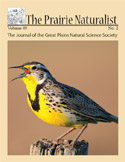Great Plains Natural Science Society

The Prairie Naturalist
Date of this Version
6-2014
Document Type
Article
Citation
The Prairie Naturalist 46:3; 2014
Abstract
Greetings GPNSS members! Hopefully this editorial finds you well and gearing up for the summer field season. As I write this editorial, I find myself reflecting on my time as Editor-in-Chief of TPN over the past 5 years. The experience has been personally and professionally rewarding in many ways, and I want to spend some time discussing something that I have experienced not only as a fellow author and Associate Editor, but also as a journal Editor.
Reviewer criticism. Thinking back to when I was appointed Editor, how I viewed criticism then is very different than how I think about it now. If asked then whether I enjoyed being criticized, I would promptly have answered “of course not.” However, dealing with criticism is now a daily occurrence for me, whether in the form of constructive criticism provided by referees and Associate Editors or interacting with authors who are unhappy with the outcome of the peer-review process (Chamberlain 2009). Undoubtedly, all of you can relate to having your work criticized during the peer-review process. I now (more than ever) am convinced that openly accepting criticism and maintaining an objective perspective when addressing it are fundamental components of successfully publishing your work (Chamberlain 2009). Easier said than done, right? Accepting criticism clearly is not easy, especially given the effort required to gather field data and preparation of scientific manuscripts. All of us can relate to the “sting” of having our work criticized by others. However, referees and Associate Editors are providing authors with, from what I can tell, virtually a thankless service. Admittedly, the author in me still has a hard time believing this at times, particularly following my initial review of an undesirable decision letter! Personal feelings aside, having others criticize your work ultimately improves the quality of your work. To this end, helpful comments provided by referees and Associate Editors should be embraced by authors, which at times can be difficult. However, doing increases the effectiveness and efficiency of the peer-review process (Chamberlain 2009), and increases the likelihood of your work eventually be accepted for publication. Further, criticism is useful for authors and receiving constructive comments on your work is essential for ensuring a high level of publication rigor (Chamberlain 2009). Referees should strive to provide relevant criticism of a colleague’s work based on your expertise and perspective that is capable of benefitting authors. What makes your review relevant and important to authors is not simply being critical, but rather your experience and knowledge that you draw upon when providing criticism to others.
Included in
Biodiversity Commons, Botany Commons, Ecology and Evolutionary Biology Commons, Natural Resources and Conservation Commons, Systems Biology Commons, Weed Science Commons


Comments
Published by the Great Plains Natural Science Society. Used by permission.